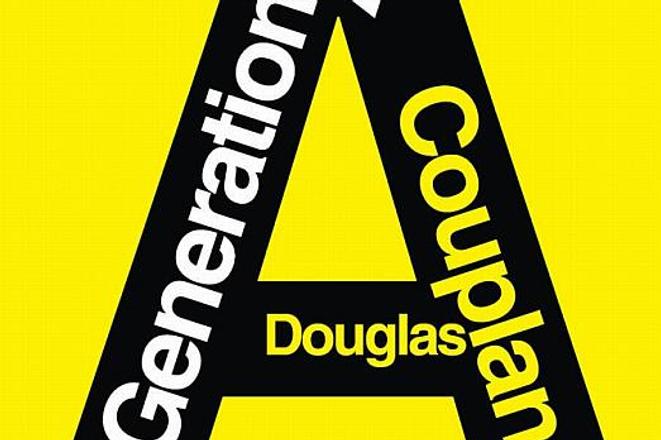IN THE early 1990s, the Canadian novelist Douglas Coupland was among the first artistic figures to catch the whiff of teen spirit that would come to fuel the decade’s disaffected. His literary debut, Generation X, was sub-titled "Tales for an Accelerated Culture" and the book was a bible for the children of the baby boomers, vast swathes of innovative and intelligent youth, who were wasting their talents in dead end “McJobs” and struggling to make sense of a world that favoured blandness over invention. Coupland’s novel popularised the Generation X moniker and promoted him overnight to the role of spokesman for the slouching classes.
Each of Coupland’s subsequent 10 novels could be regarded in some ways as a sequel. As marketeers and advertisers strengthened their grip on the modern world, Coupland’s characters continued to regard dropping out as a crucial tactic to tolerate their surroundings. Microserfs, Girlfriend in a Coma, Miss Wyoming, All Families are Psychotic and others all discussed the theme of isolation in a rapidly homogenising world. What marked them all as Coupland creations, however, was an enduring stream of optimism that seemed to flow alongside the cynicism. His characters sneered, but did so in the hope that it would keep them alive.
For obvious reasons of nomenclature, Coupland’s latest offering, Generation A, will be considered a more formal follow up to his early masterpiece. It takes its title from Kurt Vonnegut’s dismissive challenge to the Generation X phenomenon—“The media do us all such tremendous favours when they call you Generation X, right? I hereby declare you Generation A, as much at the beginning of a series of astonishing triumphs and failures as Adam and Eve were so long ago.” And Coupland seems happy to have the boundaries blurred between the beginning and the end of an era.
Generation A is set in an unspecified near future, wholly recognisable despite two major developments. First, environmentalists’ gloomy predictions have been realised and bees are now thought extinct. At the same time, the world’s population has grown silently addicted to a drug named Solon, which does not only comfort against loneliness, it actually makes such a state attractive. Users seek only their own company and “society” is rendered less than a sum of its parts. Coupland’s casual nihilists have therefore more evidence than ever to consider their outlooks prescient.
The world is roused from its communal slumber when five young people, one American, one Canadian, one French and one each from Sri Lanka and New Zealand, are stung by bees. With Earth itself resembling a vast celebrity obsessed reality-show, the five ironically dub themselves “Wonka children” and are plastered across billions of television and computer screens. They are then whisked away for a series of sinister experiments, apparently to determine why they were selected for the elusive stingers’ special treatment.
The five relate their tales in a round-robin narrative and as with much of Coupland, there are many passages that sparkle, but also plenty that seem forced. Coupland has always seemed addicted to observation but is sometimes guilty of employing his fictional entities merely as chirruping mouthpieces for his mass of preoccupations.
The most successful moments come when a particular vision gels with its orator, such as when the exhibitionist Zack offers: “I mean, everyone I know – hell, the whole country – is baked on drugs, clueless as dirt and morbidly obese.” But such snarky generalisations are less convincing from the recently-lapsed Christian Diana, or Harj, who begins the novel as a humble call centre operative.
The high points in any Coupland yarn still outnumber the low and Generation A is rewarding in its belief that the art of storytelling holds the secret to the planet’s prosperity. “How can we be alive and not wonder about the stories we use to knit together this place we call the world?” says one character as the five become embroiled in an exchange of short stories.
The downside is that Coupland’s canon is itself homogenising. His themes and attitudes were once utterly modern and audacious, but every repetition dulls the thrill. Generation A is thus just another good Coupland novel that is not, however, as breathtaking as his first.


